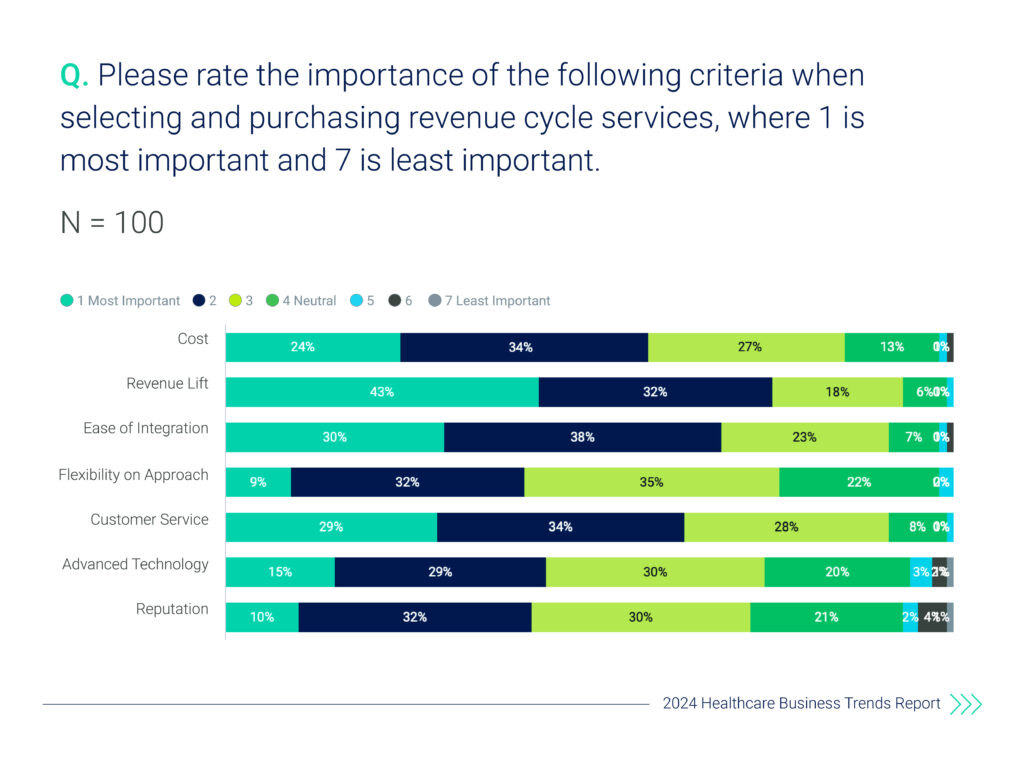What you need to know: When it comes to selecting the right revenue cycle management (RCM) partner, there are crucial factors beyond cost considerations. For 43% of executives, the ability to generate revenue lift is their number one most important criterion in selecting an RCM partner; just 24% of executives would prioritize vendor cost above all else. A majority of executives also think it’s important to partner with a single RCM firm rather than with multiple, reducing duplicative work and allowing for integrated, streamlined efforts. Think of the revenue cycle as a value driver and plan your strategy with growth in mind.
As many healthcare executives opt for a single, comprehensive RCM partnership, the high value of performance and outcomes is becoming clear. The real question isn’t merely about selecting an RCM partner — it’s about choosing the right partner capable of driving tangible and meaningful results.
End-to end RCM by the numbers
In a recent survey of more than 100 executives representing organizations ranging from multi-hospital systems to specialty physician groups, 95% expressed a keen interest in pursuing end-to-end RCM managed services to tackle critical business issues.
One robust, comprehensive RCM partnership allows organizations to address challenges and streamline processes in a way that can be difficult and duplicative when revenue cycle responsibilities are spread out across multiple vendors.
Survey results bear this out; not only did 61% of executives state that managed services provide superior results compared to in-house operations, but 60% of executives also think it’s important to partner with a single firm for RCM services.
The majority of executives, then, are seeking integrated solutions that drive comprehensive value across the revenue cycle. But what does that value look like?
A shifting focus: performance over cost
Leaders are honing in on the factors that drive tangible results. When ranking the most important factors in selecting an RCM partner, healthcare executives named their number one most important criterion:
Concerns about revenue lift were far and away the most important factor for choosing an RCM partner. Customer service was ranked as the second most important factor, critical to 29% of respondents, recognizing the importance of a seamless and patient-centric approach within revenue cycle management.
It’s a clear indication that healthcare leaders are placing a premium on partnerships that directly impact the bottom line and an organization’s own customers. This growing reliance on external partnerships signifies a departure from the traditional emphasis on minimizing costs. Now, the focus is on maximizing value.
Reframing the revenue cycle as a value driver
Providers are beginning to shift their perspective from the revenue cycle as a cost center to a value driver. This means changing the viewpoint that a successful RCM strategy is one that simply minimizes costs. More and more, healthcare executives are investing and staffing in order to grow their revenue cycle strategically in a way that improves payment accuracy and reduces revenue leakage.
This might mean investing in patient advocacy efforts, new technology, internally developed capabilities or even commercial opportunities that support the revenue cycle. Nor does investment stop at tools or partnerships. HFMA notes that, for some organizations, having a growth mindset for the revenue cycle may mean funding the professional growth and development of existing staff members. For others, a refocused revenue cycle may call for expanding the talent pool to include those with a laser focus on customer engagement or high critical thinking skills.
Ensuring front-line RCM employees are customer-focused enhances the patient experience — which should be a primary goal for every healthcare organization.
The bottom line
Today’s healthcare executives are selecting vendors based on factors like revenue lift and customer service, emphasizing growth and performance as the true barometers of success.
Now, it’s about what an organization can get out of an RCM relationship, rather than simply what it must put in — and in a competitive healthcare environment where every reclaimed dollar counts, the comprehensive value of a single end-to-end RCM partnership cannot be understated.


